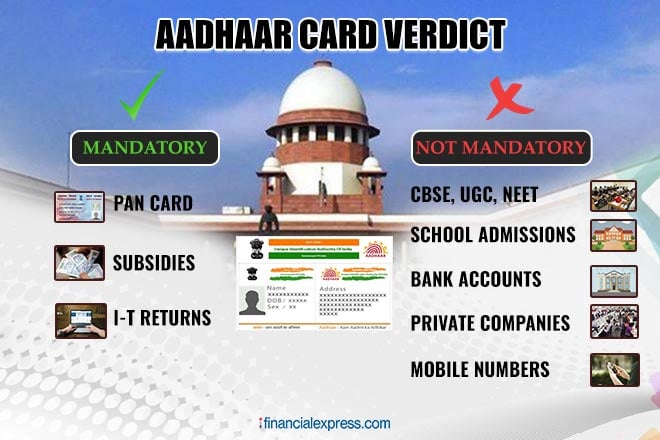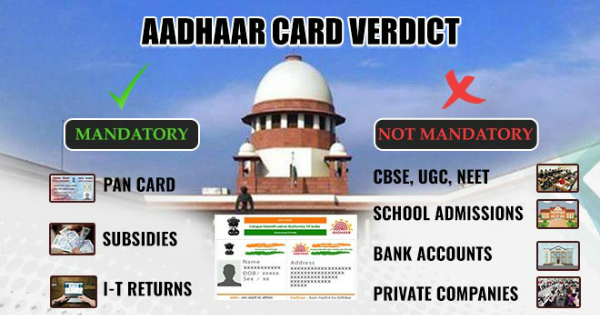The Supreme Court on Wednesday 26th Sep 2018 made a landmark judgment on Aadhaar Card. The Supreme Court upheld the legality of Aadhaar restricting it to disbursement of social benefits and removing its requirement for cell phones and bank accounts, reported news agency IANS. Below are few main observations of the supreme court #AadhaarVerdict which will help you in current affairs and GK section of various competitive exams.
SSB Interview Preparation Material [ 100% Recommended]
- Let’s Crack SSB Interview [Book]
- SSB Psychological Tests – Deep Dive [Book]
- Individuals and corporates cannot collect Aadhaar data.
- Government not to give Aadhaar to illegal immigrants.
- Aadhaar need not be made compulsory for school admissions.
- Linking Aadhaar to telecom services unconstitutional.
- No person can be denied govt benefits only due to the absence of Aadhaar.
- No need to link bank accounts, mobile numbers to Aadhaar.
- Aadhaar card is mandatory for PAN linking, Income Tax return.
- Aadhaar can be passed as Money Bill.
- Nothing in Aadhaar Act that violates the right to privacy of an individual.
- No child can be denied benefits of any schemes on not being able to bring their Aadhaar number.
- CBSE, NEET, UGC cannot make Aadhaar mandatory, also not compulsory for school admissions.
Supreme Court’s observations on Aadhaar: news agency IANS
- It is better to be unique than the best. Because, being the best makes you the number one, but being unique makes you the only one. ‘Unique makes you the only one’ is the central message of Aadhaar.
- Education took us from thumb impression to signature, technology has taken us from signature to thumb impression, again.
- The architecture of the Aadhaar Act reveals that the UIDAI is established as a statutory body which is given the task of developing the policy, procedure and system for issuing Aadhaar numbers to individuals and also to perform authentication thereof as per the provisions of the Act.
- Throughout their lives, individuals are supposed to provide information: be it admission in a school or college or at the time of taking job or engaging in any profession or business activity, etc.
- When all this information is available in one place, in the form of Aadhaar card, it not only becomes unique, it would also qualify as a document of empowerment. Added with this feature, when an individual knows that no other person can clone it, it assumes greater significance.
- The scheme (Aadhaar) by itself can be treated as laudable, more so, when it is voluntary in nature. Howsoever benevolent the scheme may be, it has to pass the muster of constitutionality.

- In a scenario where the State is coming out with welfare schemes, there cannot be undue intrusion into personal autonomy on the pretext of conferment of economic benefits.
- The architecture of Aadhaar as well as provisions of the Aadhaar Act do not tend to create a surveillance state. This is ensured by the manner in which the Aadhaar project operates.
- The use of Aadhaar number has been increased manifold and, therefore, it is also necessary to take measures relating to ensuring security of the information provided by the individuals while enrolling for Aadhaar card.
- The entire aim behind launching this programme is the ‘inclusion’ of the deserving persons who need to get such benefits. When it is serving much larger purpose by reaching hundreds of millions of deserving persons, it cannot be crucified on the unproven plea of exclusion of some.
- What we are emphasising is that remedy is to plug the loopholes rather than axe a project, aimed for the welfare of large section of the society. Obviously, in order to address the failures of authentication, the remedy is to adopt alternative methods for identifying such persons, after finding the causes of failure in their cases.
- We again emphasise that no person rightfully entitled to the benefits shall be denied the same on such grounds. It would be appropriate if a suitable provision be made in the concerned regulations for establishing an identity by alternative means, in situations like change in formation of fingerprints for various reasons, or failure of iris test due to certain reasons including blindness of a person.
Current Affairs eBooks
- Current Affairs Aug 2018 eBook
- Current Affairs July 2018 eBook
- Current Affairs June 2018 eBook
- Current Affairs May 2018 eBook
- Current Affairs April 2018 eBook
- Current Affairs Mar 2018 eBook
Following are the 10 questions which the apex court considered during the verdict.
1. Whether Aadhaar creates or has tendency to create surveillance state and is, thus, unconstitutional
No. Court rules the argument that Aadhaar would create an architecture for surveillance wasn’t well founded, and that it struck down any provisions of the Act that could give rise to such fears.
2. Whether the Aadhaar Act violates right to privacy and is unconstitutional
No. Court rules nothing in the Aadhaar Act violates right to privacy of individual — as defined by the previous SC judgment that held Right to Privacy to be a fundamental right — and that most of the data collected could be considered “in public domain”.
3. Whether children, benefits to them & school admissions can be brought within Aadhaar Act
No. Article 21A of the Constitution guarantees right to education as a fundamental right and insisting on an Aadhaar card would infringe on this right as well as on a child’s right to privacy. Consent of the parent or guardian is essential to enroll a child. On attaining majority, the child can choose to exit from Aadhaar.
4. Whether certain provisions of the Aadhaar Act relating to enrolment, updates, residency, involving private agencies in enrolment, etc are unconstitutional
The court did not find a basis for some of the apprehensions as it felt encryption and security of data is satisfactory and reasonable safeguards are in place, but made some suggestions regarding amendments and changes.
5. Whether the Aadhaar Act defies the concept of limited government, good governance and constitutional trust
The court observes, “…it is difficult to agree with the sweeping proposition advanced by the petitioners that the Aadhaar project is destructive of limited government and constitutional trust,” adding, it has struck down, read down or tweaked “some provisions which we found offending”.
6. Whether the Act could be passed as a ‘Money Bill’ within the meaning of Article 110 of the Constitution
Yes. Four of the judges saw no problem in the Act going through as a Money Bill but Justice Chandrachud called it “a fraud on the Constitution” and a “subterfuge”.
7. Whether Section 139AA of the Income Tax Act, 1961 relating to linking of Aadhaar and PAN violates the right to privacy and is unconstitutional
No
8. Whether Rule 9(a)(17) and notification of Prevention of Money Laundering Rules, 2005, which mandate linking of Aadhaar with bank accounts, are unconstitutional
Yes. The court rules it does not meet the test of proportionality and is also violative of the right to privacy of a person that extends to banking details. It also observes no explanations have been given on how mandatory linking of every bank account will eradicate or reduce problems of money laundering and black money.
9. Whether telecom dept’s circular dated March 23, 2017 mandating linking of mobile no. with Aadhaar is illegal and unconstitutional
Yes. Court rules it was a disproportionate and unreasonable state compulsion, and that for the misuse of SIM cards by a handful of persons, the entire population cannot be subjected to intrusion into their private lives.
10. Whether certain actions of the respondents are in contravention of the interim orders passed by the court
Court observes that the state was unable to respond to the petitioners’ contention about their being lesser rights-invasive measures for the same purpose. Emphasises that financial exclusion caused due to errors in Aadhaar-based authentication violate an individual’s right to dignity.
Sources: NDTV, TOI, B-S






